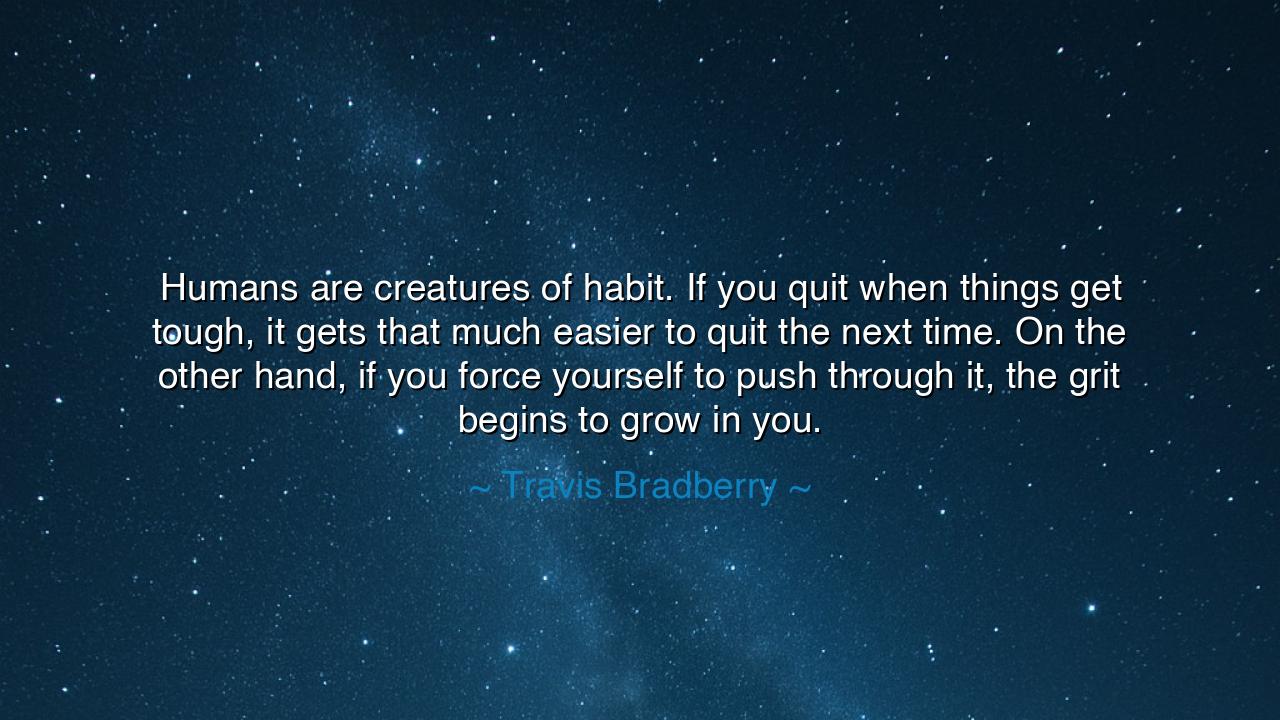
Humans are creatures of habit. If you quit when things get
Humans are creatures of habit. If you quit when things get tough, it gets that much easier to quit the next time. On the other hand, if you force yourself to push through it, the grit begins to grow in you.






Travis Bradberry, the modern sage of emotional intelligence, once declared: “Humans are creatures of habit. If you quit when things get tough, it gets that much easier to quit the next time. On the other hand, if you force yourself to push through it, the grit begins to grow in you.” These words are not light counsel, but a map for the soul. They reveal the eternal law of perseverance: that strength is not born in ease, but in hardship, and that each choice to endure or to surrender sets the rhythm of one’s life.
The meaning of this teaching begins with the truth that humans are indeed creatures of habit. What we repeat, we become. To quit in the face of adversity does not end with that single failure; it lays down a path in the mind, a groove into which the spirit will slide again and again. Quitting becomes easier, until the will itself grows thin and fragile. Conversely, each time we resist despair and push through hardship, we lay down a different path—one of resilience. This path deepens, and the soul, like tempered steel, grows unbreakable.
The origin of Bradberry’s words comes from his lifelong work in studying human behavior, resilience, and leadership. His insight rests on psychology and neuroscience, but also on timeless human experience: the recognition that the mind is trained by repetition. Endurance breeds endurance, weakness breeds weakness. Thus he calls us not to comfort, but to courage, reminding us that the way we respond to trials becomes the pattern of our lives.
History offers shining examples of this law. Consider Thomas Edison, who failed over a thousand times in his quest to invent the light bulb. Each failure could have been an end, but each time he pressed on, grit grew within him until success was inevitable. Or look to Abraham Lincoln, who endured defeat after defeat in politics, grief in family, and the scorn of rivals. Yet he pressed forward, and in that persistence, his character was forged into the steel required to hold a nation together through civil war. Their lives echo Bradberry’s wisdom: persistence is not a single act but a habit, a growing flame that hardens the will against despair.
The lesson for us is clear: beware the habit of quitting. One surrender leads to another, until life becomes a chain of abandoned dreams. But also know this: courage, too, is habit. Each time you force yourself to keep going when everything in you says to stop, you make it easier to keep going the next time. This is how grit is born—slowly, invisibly, but with power that endures.
Practical wisdom follows: when the trial comes—and it always comes—do not ask if you feel strong enough. Act, even if trembling. Break the task into smaller steps if you must, but do not yield. Each step forward, however small, is a victory against the creeping habit of quitting. Remember that no one is born with grit; it is grown, like muscle, through resistance. Embrace the discomfort, for it is the forge in which your spirit is made.
Thus Bradberry’s words are more than advice; they are a command for life. “If you quit when things get tough, it gets that much easier to quit the next time.” Do not let this be your story. Instead, be the one who endures, who presses forward, who grows stronger with each trial. For in time, you will find that grit has become part of your being, and you will no longer wonder if you can endure—you will know that you can. And in that knowledge lies freedom, power, and the unshakable strength of the human spirit.






AAdministratorAdministrator
Welcome, honored guests. Please leave a comment, we will respond soon